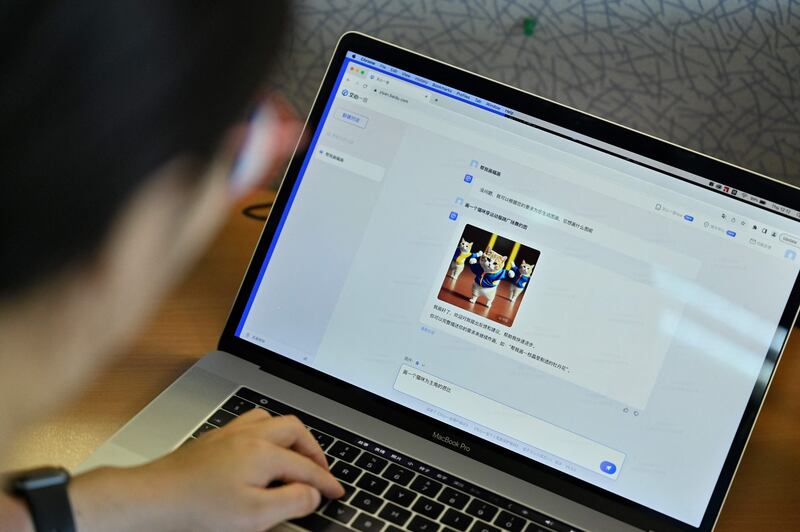China's Baidu, the country's search engine equivalent of Google, has received regulatory approval to release its ChatGPT-like Ernie artificial intelligence bot in the country.
Ernie – short for Enhanced Representation through Knowledge Integration – was released in March amid the ChatGPT craze and immediately gained traction, with its wait-list amassing more than 30,000 corporate clients then ballooning to about 1.2 million before Baidu stopped disclosing figures.
Alongside Thursday's roll-out, Beijing-based Baidu also announced that it will be releasing a suite of new AI applications within Ernie, which is now fully open to the general public.
The company is attempting to match ChatGPT, the global sensation that is so far unavailable to the general public in one of the world's biggest technology markets.
Three other generative AI apps also received the green light on Thursday, including those from Hong Kong-based SenseTime, Baichuan Intelligent Technology and Zhipu AI, which are all start-ups.
“By making Ernie Bot available to hundreds of millions of internet users, Baidu will collect massive valuable real-world human feedback,” Robin Li, chief executive of Baidu, said.
“This will not only help improve Baidu's foundation model but also iterate Ernie Bot at a much faster pace, ultimately leading to a superior user experience.”
The roll-out of Ernie Bot also boosted Baidu's stock: it rallied as much as 4 per cent on Thursday and ended 2.12 per cent higher at 139.40 Hong Kong dollars ($17.77) at the close of trading. Hong Kong-listed SenseTime also surged 4 per cent after the announcement.
The Ernie Bot app also shot up to the top spot of the Apple App Store's rankings of free apps in China within 12 hours of its public release. Google's Play app marketplace and Android operating system are unavailable in China.
China is known for its strict internet regulations, and some of the most popular global apps are unavailable in the country, including Google, Facebook, WhatsApp, YouTube and X, the microblogging platform formerly known as Twitter – though they can be accessed by using a VPN.
Instead, much like Baidu matching Google, Chinese companies have developed alternatives, including WeChat, Tencent Video, Weibo and several others.
Many in China are loyal to home-grown apps: Baidu, for instance, has a market share of more than 61 per cent as of August, way ahead of Microsoft's Bing which has about 14 per cent, data from Statista shows.
China allowing the public release of the generative AI apps could be a sign it is giving its tech companies more leeway. Beijing released its first regulation for the technology in July, saying that developers need to obtain “relevant administrative licences”, without going into further detail.
The approvals granted to Baidu and the other three companies indicate they have complied with the regulations set by the government, which has always focused on maintaining the country's status as a key player in the global technology sphere.
Ernie is the focal point of Baidu's commitment to generative AI and large language models, seeing the technologies' “immense transformative power in numerous industries” that present a “significant market opportunity”, Mr Li said in the company's second-quarter financial results on August 22.
“To stay ahead of the game, we keep upgrading our models to generate more creative responses while improving training throughput and lowering inference costs,” he said.
“Our latest foundation model … has been well recognised by our cloud customers, AI developers and industry experts.”
While AI has long been used in several applications and use cases, the emergence of generative AI has changed the game.
It rose to prominence thanks to ChatGPT, the language model-based sensation made by Microsoft-backed OpenAI capable of producing various kinds of data, including audio, code, images, text, simulations, 3D objects and videos.
Other tech major including Google and Apple have also since boosted their generative AI capabilities.
Now, countries are beginning to harness the capabilities of generative AI to serve local languages. On Wednesday, Abu Dhabi researchers launched Jais, an LLM for Arabic developed in the UAE capital, which they said is more accurate than other existing LLMs for the language.
Similar efforts are being made by SoftBank Group and NEC in Japan, and Zoho in India, also two of the key technology markets in the world.
Baidu's research arm in June said that the latest version of Ernie made “significant strides” during its beta testing phase, even claiming it surpassed ChatGPT in comprehensive ability scores and outperformed GPT-4 in several Chinese language capabilities, citing a report from China Science Daily.
Ernie's improvements “are evident in creative writing, Q&A, reasoning and code generation, as well as in training performance and inference performance”, Baidu chief technology officer Haifeng Wang wrote in the report.






